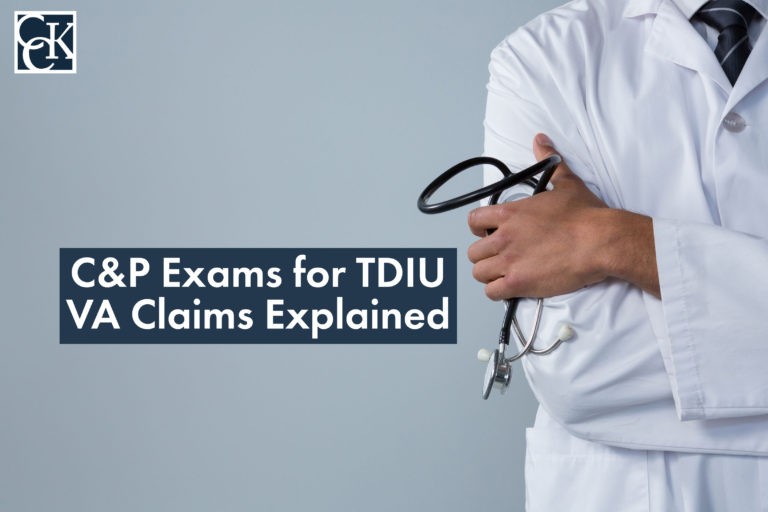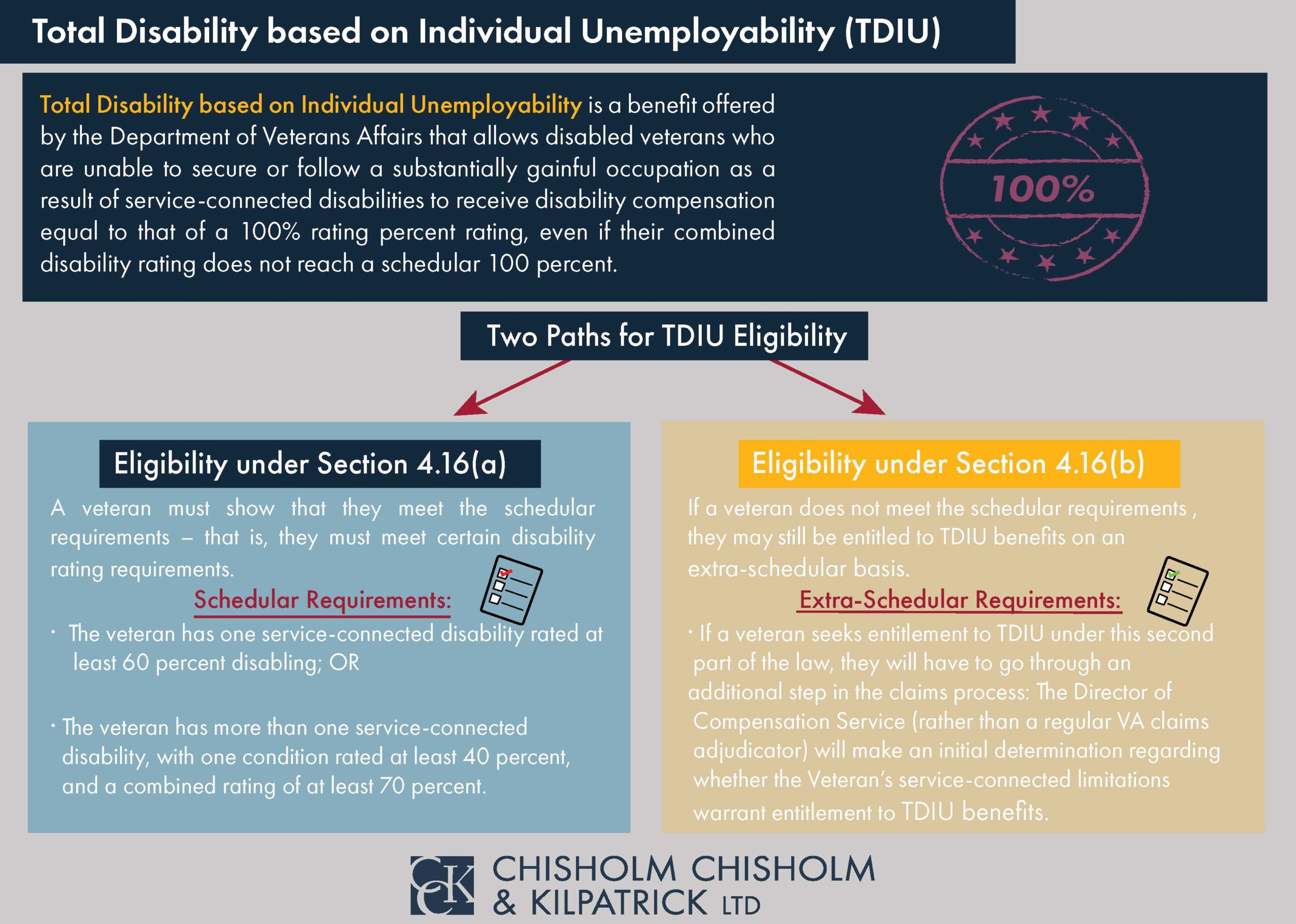C&P Exams for TDIU VA Claims Explained

CCK Law: Our Vital Role in Veterans Law
Compensation and Pension Examinations
Compensation and Pension Examinations (C&P Exams) are medical exams that are requested by VA to examine a veteran’s conditions or disabilities. VA uses these exams to collect more information and evidence about a veteran’s claimed condition before making a decision and possibly issuing a rating.
Typically, C&P exams have two purposes:
- Confirm or deny service connection for the claimed condition.
- Examine and determine the severity of the claim condition so that a rating may be issued.
The exams generally can last for varying periods of time, often between five minutes or several hours.
Who Conducts C&P Exams for TDIU?
Depending on the conditions being examined, a VA-approved doctor that meets the qualifications for that condition will conduct the exam. This means that if the veteran’s claimed condition is a mental health condition, a VA psychologist or VA contracted psychologist will generally conduct the exam. In cases of physical conditions, a VA physician or VA contracted physician will conduct the exam.
Before the exam starts, the examiner will review the veteran’s entire claims file. The claims file contains all the previously submitted documentation, including evidence and medical treatment records. The claims file will usually also contain the veteran’s service records.
In the claims and appeals process, VA has a “duty to assist,” which means that VA should take all reasonable effort to obtain evidence that supports the veteran’s claim. This means that VA has a duty to assist the veteran by obtaining medical evidence which is crucial to the veteran’s disability case, such as records from a private physician which may not be in the claim’s file.
Importantly, because VA provides for the exams, veterans do not have to pay to be examined during a C&P exam.
What is TDIU?
TDIU stands for total disability based on individual unemployability. It is a disability benefit that allows veterans, who do not meet the qualifications for VA’s 100% disability rating, to be compensated at that rate. In order to be eligible for TDIU, the veteran must show that they are unable to secure gainful employment on account of their service-connected disabilities. Gainful employment is generally considered the ability to support oneself financially.
There are generally two pathways to achieve TDIU: schedular and extraschedular. The information below outlines the differences.
- 38 CFR § 4.16a (“Schedular”) – For this form of TDIU, the veteran must have:
- One condition rated at minimum 60 percent; OR
- two conditions that can be combined to reach 70 percent, where one condition is at minimum 40 percent.
- 38 CFR § 4.16b (“Extraschedular”) – This form of TDIU is for veterans who may not be able to achieve the ratings necessary for schedular TDIU, but are still unable to obtain substantially gainful employment on account of their conditions.
- In this instance, the veteran must prove that their condition is uniquely hinders their ability to obtain substantially gainful employment and therefore should not be rated on the standard disability rating criteria.
C&P Exams for TDIU
The purpose of C&P exams for TDIU, much like other C&P exams, is to examine the veteran’s condition(s) and determine the severity. The examiner will generally be analyzing the conditions claimed to determine whether they are severe enough to preclude the veteran from obtaining substantially gainful employment. Rather than examining the severity of the conditions themselves, the examiner will be focusing on how the severity of the conditions interfere with the veteran’s ability to work.
VA will use the findings of the exam as evidence to help adjudicate and process the claim. Often, the examiner will use Disability Benefits Questionnaires (DBQs). These are forms intended to quicken the time it takes to process claims and help give veterans more control over the claims process. The forms will generally give veterans a space to answer questions about their disability, such as symptoms, severity, causes and relationship to other disabilities. In TDIU C&P exams, the DBQ will give the veteran the opportunity to explain how the claimed condition(s) impact employability.

Important Tips for TDIU C&P Exams
- Attendance – One of the most crucial parts of C&P exams is attendance. VA can deny a claim if the veteran does not attend a requested C&P exam and does not reschedule it. Skipping an exam, especially without communicating to VA, can be very detrimental to the veteran’s claim. If a veteran finds out that they have missed an exam, they should reach out to VA to try to reschedule it.
- Honesty – During the exam, it is important to be honest and thorough when speaking about the conditions being examined. Veterans will usually want to speak on their symptoms, level of impairment, and work history, particularly in individual unemployability exams. This exam is an opportunity for the veteran to explain how their conditions inhibit them from obtaining submanifold gainful work, so it is important to speak honestly and include as much information as possible.
- Persistence –VA does not usually give copies of the exam report, following the exam, to the veteran. This means that veterans should specifically request a copy of the exam to ensure that they receive one. After receiving a copy, veterans will want to review the report. If they disagree with what was said in the report, veterans can let VA know that they disagree with the report. Additionally, veterans can get their own expert opinion to refute the exam findings.
VA relies on medical doctors to conduct C&P exams. However, TDIU is not necessarily a medical assessment, but a vocational assessment. Vocational experts can provide reports and opinions that can be helpful to support a TDIU claim.
Overcoming Negative C&P Exams
As mentioned above, obtaining a vocational expert can often be a veteran’s greatest tool in challenging negative exams.
Often, a veteran who has filed a claim for TDIU will be scheduled for multiple C&P exam for each condition they listed. For example, a veteran may be service-connected at 30 percent for headaches, 10 percent for instability of the right knee, and 50 percent for PTSD. VA will then usually request three separate exams with three separate examiners: a neurological exam for headaches, an orthopedic exam for the knee, and a psychological exam for PTSD.
These three separate examiners may have separate findings as it relates to the veteran’s vocational abilities. Continuing with this example, the neurological expert might opine that the veteran can work, so long as they have the ability to take breaks when headaches come on. The orthopedic examiner might issue an opinion indicating that the veteran can work in a sedentary position, meaning they can obtain substantially gainful employment if the job allows them to sit. Lastly, the psych examiner might find that the veteran has difficulty getting along with others, so they can work as long as they are in a position that does not involve a lot of communication or cooperation with others.
When all of these specifications are added together, it becomes virtually impossible to find a position that would employ the veteran with all the necessary modifications. The veteran in this example would need to find employment that allows them to sit most of the time, remain largely independent, and take long breaks. However, since the three exams were conducted separately, there is no opinion from a VA examiner that explains the implications of these three opinions when combined. This often results in veterans being denied for TDIU, as the three VA examiners have all opined that the veteran can work and no opinion has indicated that, when combined, it would be nearly impossible to find employment under these specifications.
In cases like this one, a vocational expert can provide that bridge to explain how, when the three conditions are looked at together, they make it impossible for the veteran to secure employment.
Vocational experts can also be an asset because they specialize in how disabilities relate to the field of employment. Often VA examiners, who are qualified in medicine, are given the task of issuing opinions in vocational analysis, an area where they may not be specifically trained. This means that they may not have insight into the job market and the qualifications for obtaining employment. A vocational expert who specializes in vocational analysis can be used to provide that insight and opine on how the veteran’s conditions, when combined, hinder their ability to work or not.
Was Your VA Claim for TDIU Denied?
The veteran’s disability attorneys at Chisholm Chisholm & Kilpatrick LTD have successfully appealed thousands of VA disability denials. If your VA disability claim has been denied, we may be able to help you build a strong case for appeal. Contact our office at (800) 544-9144 for a free consultation.
About the Author
Share this Post

